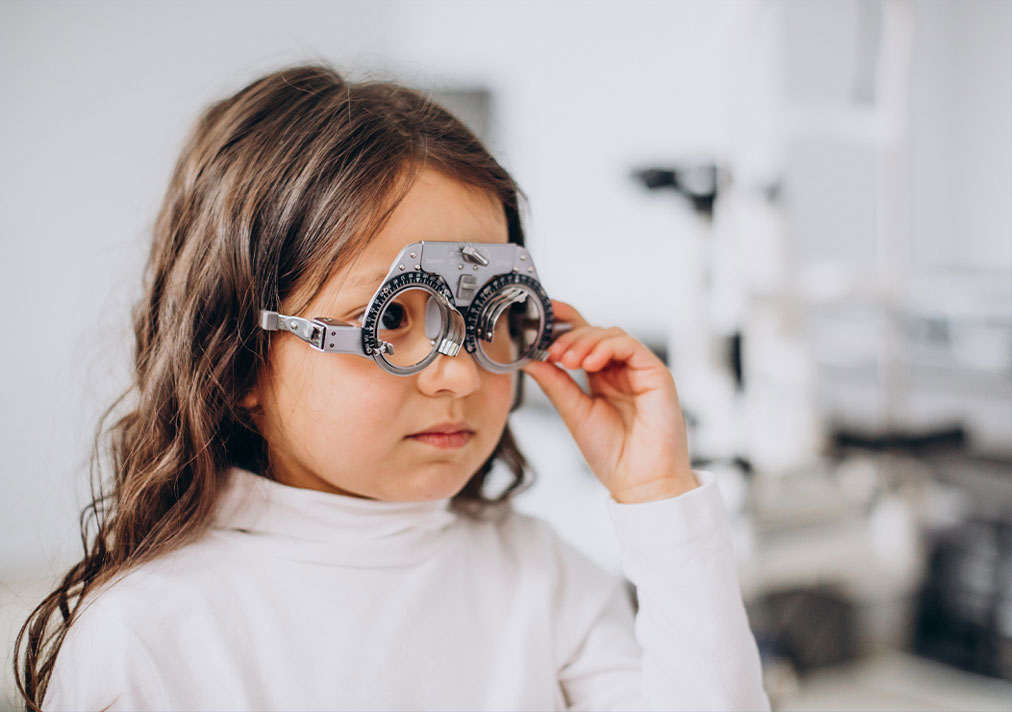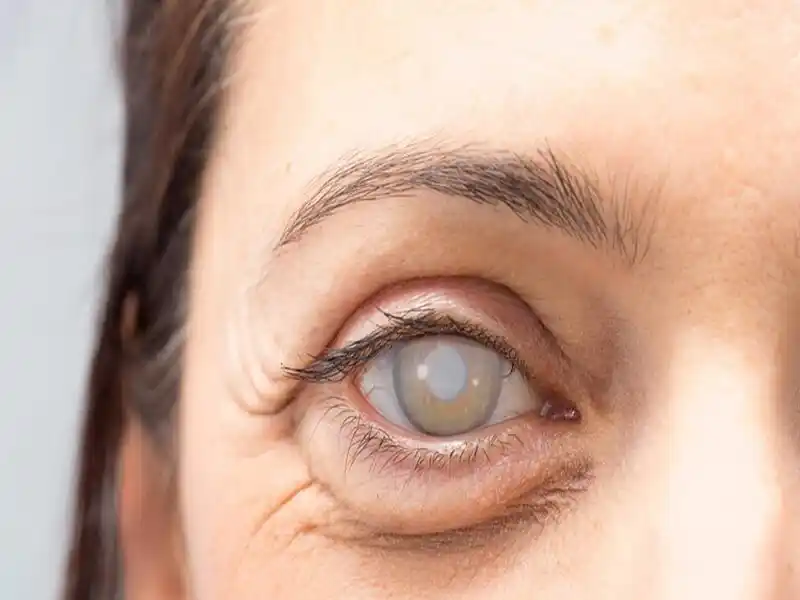Cataracts appear gradually and go unobserved at first but eventually affect your vision, which can be restored surgically by removing the cataract.
A cataract is a vision complication that inflicts damage to the normally clear lens of the human eye. This minimizes the proportion of light that can enter the eye, causing vision problems, confusion and glare, and, in some cases, double vision. Cataracts are most frequently associated with old age, but they can appear at any age due to multiple reasons. This could be due to certain prescriptions, such as steroids, or a medical condition, such as diabetes.
Cataracts typically appear gradually and go unobserved initially, but eventually affect your vision. The only way to regain your vision is to surgically remove the cataract. Before your surgery, your healthcare provider schedules a pre-operative evaluation appointment with your surgeon to give you instructions on how to prepare for your operation as well as assess your suitability for the procedure and anesthesia.
Do’s and Don’ts After Cataract Surgery
It’s critical to look for your eyes during the healing process following cataract surgery. Although cataract surgery is fast and often painless, it takes time for your eyes to recuperate completely. Observing the dos and don’ts after cataract surgery can help to promote a smooth recovery process.
Dos:
- Put on safety glasses: Use the included eye shield to screen your eyes from scrapes and bumps, especially at night.
- Observe prescription instructions: To avoid infection and lessen inflammation, use the eye drops and medicines as recommended by your physician.
- Rest your eyes: Allow your eyes to recover. Steer clear of prolonged reading or screen time, especially in the initial days following surgery.
- Wear sunglasses outside: To protect your eyes from intense sunshine and avoid discomfort, shades with full UV protection are essential.
Don’ts:
- Avoid touching your eyes too much: Do not massage your eyes, even if they are itchy or painful. This might make things more difficult or prolong your recuperation.
- Avoid doing heavy lifting: Physically demanding tasks as they might put further strain on your eyes and perhaps damage your healing lens.
- Avoid hot tubs and swimming pools: The water from these places can contaminate your eyes with germs and raise your risk of illness.
- You can make certain that your recovery goes as smoothly and without complications as possible by following the do’s and don’ts after cataract surgery.
Things To Do Before Your Cataract Surgery
- You must arrive at the hospital according to the admission date and time specified in your appointment letter. If your surgery is scheduled for the afternoon, you will be admitted either early in the morning or later in the morning.
- When you arrive, your information will be checked against your medical records, and the surgeon will inspect your blood pressure and pulse rate, irrespective of whether you don’t have diabetes or high blood pressure. You will be required to sign or reconfirm your surgical consent. So be mentally and physically prepared.
- Before surgery, you will be given dilating eye drops to put in the eye that is being operated on. The drops will dilate the pupil, allowing the surgeon to see inside your eye more clearly. You may have been given this eye drops to use at home before the surgery date. Make sure you have applied the drops as per the prescription.
- There is no need to undress if you are having surgery with a local anaesthetic, but it is best to wear comfortable clothing that is not too tight around your neck.
- As you will be unable to drive immediately post-surgery, make arrangements for a ride home. You must also plan on taking one to three days off from daily tasks to recuperate and rest.
Also Read: Precautions After Cataract Operation
Things To Avoid Prior To Your Cataract Surgery
- There is a possibility that stomach acid will enter your lungs while you are sedated, causing harm. To be secure from this outcome, you should fast for about 12 hours before surgery.
- Makeup, moisturisers or other body care products should be removed the night before cataract surgery because they can lead to severe infections.
- As cataract surgery means breaking the lens, there may be some minor bleeding. While it is normally irrelevant, your eye specialist may still advise you to stop taking paracetamol or anti-clotting medications before your procedure just to be safe.
- You should cease wearing contact lenses at least three days prior to surgery and switch to glasses to prevent irritating your eye.
- You must abstain from intoxicating beverages, including champagne, wine, and beer, for at least 24 hours prior to your cataract procedure.
Food Not to Eat After Cataract Surgery
Your diet has a big impact on how quickly your body heals after surgery. Although there aren’t any particular dietary guidelines to follow after cataract surgery, avoiding some foods can help reduce inflammation and speed up recovery. Gaining knowledge about foods not to eat after cataract surgery will facilitate the recuperation process.
Steer clear of meals heavy in sugar, salt, or bad fats since they might exacerbate inflammation and hinder your recuperation. Eat less processed food, such as chips, sugary treats, and fried fast food. Furthermore, consuming too much alcohol and coffee might cause dehydration, which can impede the healing process.
Rather, prioritize eating nutrient-dense foods high in antioxidants, omega-3 fatty acids, and vitamins A, C, and E. Nuts, seeds, avocados, fresh fruits, and leafy greens together with fatty fish can all help with recovery and eye health. Your body will appreciate that you gave it the necessary nourishment during this crucial period of recuperation.
Showering and Washing Hair After Cataract Surgery
Knowing how to handle simple hygiene chores, such as showering and washing hair after cataract surgery, is an often missed aspect of post-surgery recuperation. Even though you might feel ready to resume your regular activities, it’s important to take extra care in the initial days to prevent soap or water from getting into your healing eye.
Showering the day before your procedure should be avoided at all costs. The day following your procedure, you can resume taking showers, but proceed with caution. Make sure your face and eyes are dry, especially during the first several days. When you start bathing again, which is normally the day following surgery, take extra care not to get water in your eyes.
When shampooing your hair, lean your head back and cover your eyes to avoid aggravating the sensitive region with shampoo or water. When cleansing your face, avoid splattering water by gently cleaning the area around your eyes with a wet towel. Keep in mind that getting soap or water in your eyes can cause discomfort or even an infection, which can make healing more difficult.
Housework After Cataract Surgery
It’s normal to desire to resume your usual routine after surgery, but you should go cautiously when doing housekeeping. Bending, lifting, or any other action that puts more strain on your eyes may qualify as rigorous housework after cataract surgery.
Don’t carry heavy things, hoover, or mop for the initial weeks. As long as you’re not leaning down or straining your eyes, simple jobs like dusting or light organizing are okay. If you must clean the house, make sure to take frequent pauses and stay away from chores that might irritate your eyes with dust or other particles.
After a couple of weeks, you can progressively resume light housekeeping, but pay attention to how your body reacts. It’s essential to quit and see your doctor if you feel any pain.
What to Expect During Cataract Surgery
Cataracts are a common disorder where the lens of the eye gets clouded, impairing vision. Cataract surgery is a frequent and successful operation aimed at restoring eyesight. During the procedure, the clouded lens is removed and replaced with an intraocular lens (IOL), a clear artificial lens. Here’s a clear rundown of what to anticipate from this process:
Preparing for Surgery
To identify the appropriate type of IOL for you and ascertain the depth of your cataracts, your healthcare professional will do a comprehensive eye exam before the procedure. You’ll get detailed instructions, which can involve fasting the night before the procedure and using dilating eye drops. When you get to the hospital the day of the surgery, your vital signs will be taken and permission paperwork will need to be signed.
Surgery Process
Most cataract surgeries are done as outpatient procedures, so you can return home the same day. Under local anesthesia to numb the eye region, the process typically takes 15 to 30 minutes. You will be conscious yet comfortable throughout the procedure. A little incision will be made to access the lens, and your eye will be kept open with a small device.
The procedure known as phacoemulsification will be performed by the surgeon, who will use ultrasonic waves to fracture the clouded lens into tiny pieces. After that, the eye’s pieces are carefully suctioned out. Using the same incision, the prosthetic lens is implanted after the cataract is removed. The IOL is intended to correctly focus light onto the retina and is positioned in the same spot as the natural lens.
Why It’s Necessary
When cataracts start to negatively impact everyday activities and general quality of life, cataract surgery becomes essential. Reading, driving, and facial recognition are just a few of the activities that can be hampered by cataracts’ glare, impaired vision, and difficulties seeing at night. The procedure replaces the clouded lens with a clear artificial lens to restore crisp eyesight and increase your capacity to do daily tasks.
Recovery Tips and Post-Surgery Care
After cataract surgery, proper care is essential to a successful recovery and optimal outcomes. The following are crucial guidelines to adhere to following surgery:
- Keep all of your follow-up visits with your ophthalmologist booked. These check-ups are crucial for tracking your healing process and making sure the prosthetic lens is operating as intended.
- As instructed, apply the prescription eye drops; do not miss doses. To lower the chance of infection, it’s also critical to take any antibiotics as directed.
- Put on the included eye shield or safety glasses to screen your eyes from unintentional pressure or rubbing. When you sleep, wear the shield and refrain from touching or pushing on your eyes.
- For a few weeks following surgery, avoid heavy lifting and intense activity. Eye pressure can be raised and healing is affected by bending over, carrying large things, and intense activity.
- Keep your eyes dry and avoid swimming, hot tubs, and getting water directly into your eyes for a few weeks. Bacteria can be introduced by water, raising the possibility of illness.
- Keep a watch out for indicators of problems, such as blurred vision, intense discomfort, or ocular discharge. If you see any of these symptoms, contact your eye surgeon right away.
How Long After Cataract Surgery Can You Bend Over?
It may surprise you to learn that following surgery, even seemingly little actions like bending over might cause strain on your eyes. Patients so naturally want to know how long after cataract surgery can you bend over.
Bending over might exacerbate intraocular pressure, which can impede the healing process. The first one to two weeks following surgery should be spent without leaning over at all. This implies that you should refrain from doing any action that requires you to bend forward and droop your head, such as picking up heavy things or tying your shoes.
If you need to lift anything, bend your knees instead of your waist. It’s crucial to pay attention to your body and gradually begin mild bending activities after two weeks. If you experience any pain, stop right away and give yourself a rest. It is best to speak with your eye doctor about when you might be allowed to bend over following cataract surgery.
What Is Considered Strenuous Activity After Cataract Surgery?
A typical post-procedure query is, What is considered strenuous activity after cataract surgery? Activities that increase blood pressure and pulse rate or require heavy lifting, which might strain your eyes, are considered strenuous.
For a minimum of four to six weeks following surgery, the following activities are classified as vigorous and should be avoided:
- Heavy lifting (any weight above ten pounds)
- Strenuous activities, like weightlifting, cycling, or jogging
- Sports involving contact (football, basketball, etc.)
- Swimming or using a hot tub should be avoided as the water might contaminate the healing eye.
- Frequently stooping or performing actions that require lowering your head below your waist.
After cataract surgery, it is best to speak with your eye doctor before starting any type of intense exercise again. You can progressively resume more strenuous activities once the doctor gives you the go-ahead, but you should always get back into them cautiously. Long-term success depends on keeping your eyes safe during the healing process.
How Long Do I Need to Wear Dark Glasses Outside After Cataract Surgery?
It’s crucial to wear dark glasses outside after recuperating from cataract surgery to preserve your eyesight. However, how long do I need to wear dark glasses outside after cataract surgery?
During the initial weeks after surgery, your eyes will be light-sensitive, and exposure to strong sunlight or UV rays may cause pain and strain. You should protect your eyes from direct light for the initial one to two weeks by wearing dark glasses whenever you go outside, even on overcast days.
Wearing dark glasses can protect you from UV radiation, minimizing damage and improving visibility in strong light. Wearing dark glasses also helps protect your healing eyes from dust and other airborne toxins.
If you live in a very sunny location, you might still feel more at ease wearing dark glasses outside after the first healing time. Even when they have fully recovered, many opt to wear UV-blocking sunglasses to protect their eyes from overtime sun damage.
Why Eye-Q India?
Your eyes need the greatest care possible, and you want a partner you can trust to walk you through every step of the procedure, from surgery to recuperation. What makes Eye-Q India unique? Their dedication to offering top-notch eye care while putting the needs of the patient first is the solution.
Among the most reputable eye care facilities in India are Eye-Q Super-Speciality Hospitals, which are renowned for their skilled surgeons, cutting-edge equipment, and extensive services. Eye-Q’s team will be at your side every step of the way to ensure you receive the best possible care, whether you’re having cataract surgery or any other eye procedure.
As one of India’s top eye hospitals, Eye-Q has many happy patients and decades of experience. For anybody seeking to enhance their eyesight by surgery or other procedures, they are the best option since they put a high priority on patient comfort and positive results. If you are seeking professional advice and the best care available, Eye-Q India needs to be your only choice.
Eye-Q Super-Speciality Hospitals is here to answer your questions and offer professional treatment and assistance as you proceed towards better eyesight. You’ll soon be able to see everything more clearly if you pay close attention to your doctor’s instructions and take precautions to safeguard your eyes during your recuperation.
Eye-Q Super-Speciality Hospitals: Cataract Surgery
The precision and patient care of cataract surgery are the main priorities of Eye-Q Super-Speciality Hospitals. The hospital makes use of cutting-edge technology to guarantee the best possible care.
The surgical team is made up of professional ophthalmologists with experience who know how to remove cataracts and implant IOLs utilizing cutting-edge technology. Eye-Q is dedicated to providing patients with cataract surgery with successful vision restoration and an enhanced quality of life overall.




